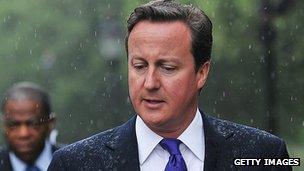Hague rejects swing to right amid heavy Tory election losses
- Published

David Cameron's Conservatives had expected to lose seats
The Conservatives will not swing to the right or left, after losing 405 seats in the local elections, Foreign Secretary William Hague told the BBC.
He said the government would carry on with its economic strategy and argued the results were within the "normal range of mid-term results".
Some Tories have complained that coalition policies on gay marriage and Lords reform have cost them votes.
The party has lost control of 12 councils as Labour made gains.
Labour won control of Dudley, Plymouth, Southampton, Great Yarmouth and Harlow councils from the Conservatives and say the results are a "wake-up call" for the government to change course in its deficit-cutting strategy.
'Repairing damage'
The UK Independence Party secured an average vote of 13% in those wards where it stood candidates - the party's best result yet in local elections that were not held on the same day as elections to the European Parliament.
Asked whether the Conservatives should be looking to win back votes on the right from UKIP, or on the left from Labour, Mr Hague told the BBC: "Neither. We carry on with what's essential in this country, turning around this country's finances and economy - it's not a matter of going right or left.
"It's a matter of repairing the damage from the last government, of revamping in a very big way our education and welfare system so that this country can compete in the future, reducing business taxes... so that businesses can invest, so that the growth of private sector jobs can continue in this country. These are the things that are essential and it doesn't involve any manoeuvre to right or left."
Conservative MP Gary Streeter said party supporters were "gagging" for some more traditional right-wing policies in areas such as law and order.
Lords reform
And Conservative Defence Minister Gerald Howarth has suggested that the prime minister should consider the results alongside Tory unease over some coalition policies on issues like gay marriage and House of Lords reform: "A lot of Conservatives have written to me saying 'I am a lifelong Conservative, there is no mandate for this, why is this being proceeded with?'"
But Mr Hague said he did not think the election results "are about those issues" and said the country understood that the party was in a coalition.
"The real test of governments is over time. It's perfectly common in local elections two or three years in to lose seats. These are not phenomenally good results at all for the Labour Party who can't get 40% of the vote even when both the other parties are in government."
Deputy Labour Leader Harriet Harman told the BBC that voters were concerned "about what the government is doing on the economy" and said the results were "a wake-up call to the government that they've got the change course on the economy".
But Mr Hague said changing course on the government's deficit-cutting strategy would have "catastrophic" results on the country's credit rating and mortgage rates.
He said: "The real test is whether in 2014/2015 as we come to the general election, people can see the economic benefits of what we have been doing. I believe they will and that means we really have to keep on this course."
He added that Conservative policies such as the referendum on any future transfer of powers to Europe and reducing immigration were being implemented and it was "very important that the whole Conservative Party communicates those things".
In better news for the Tories, the party regained Winchester - which had been under no overall control - and, in the last result of election day, Boris Johnson won a second term as London mayor.
<bold>· All the latest election results are available at </bold> <link> <caption>bbc.co.uk/vote2012</caption> <altText>BBC Vote 2012 special report and results service</altText> <url href="http://www.bbc.co.uk/news/uk-politics-17270000" platform="highweb"/> </link>